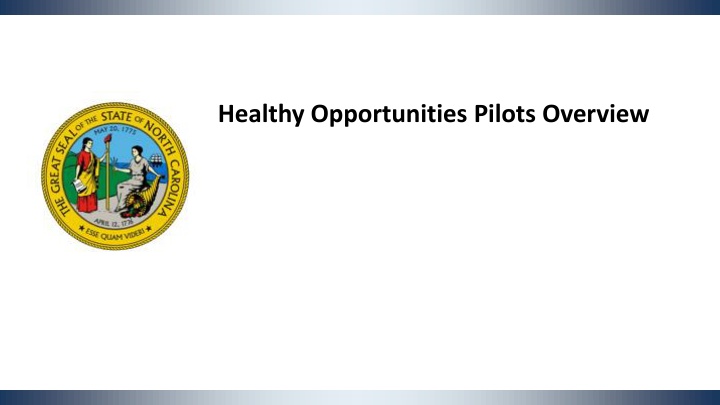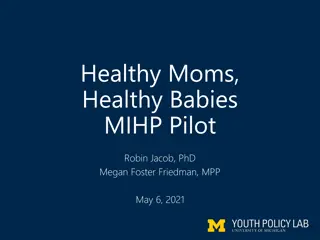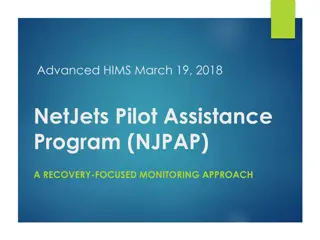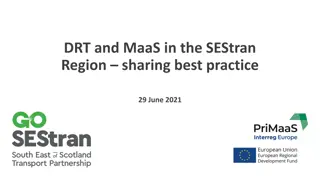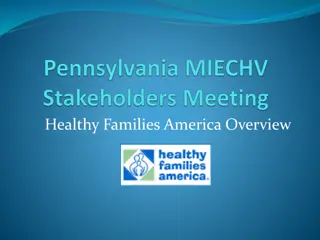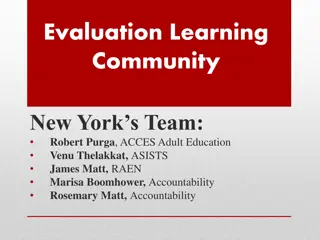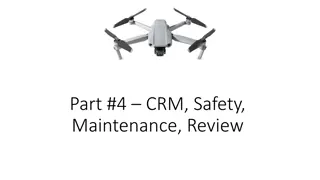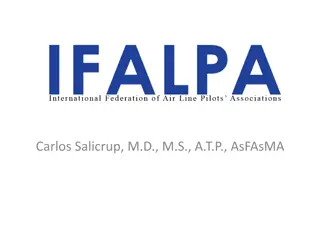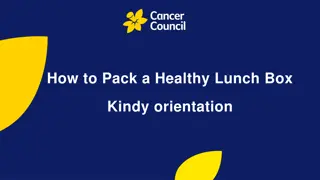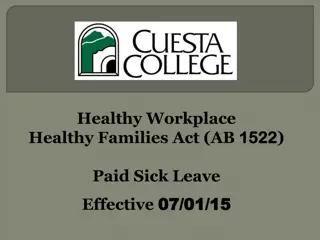Healthy Opportunities Pilots Overview
The Healthy Opportunities Pilots (NC HOP) in North Carolina aim to integrate evidence-based non-medical services into Medicaid to improve health outcomes, promote health equity, and reduce costs. The pilot funds support services in areas like housing, transportation, food, and interpersonal safety. Key entities, such as Pilot Entities, Network Leads, and Human Service Organizations, play roles in managing services, care management, and budget allocations. The program focuses on evaluating the impact of services on populations and creating sustainable partnerships for Medicaid integration.
Download Presentation

Please find below an Image/Link to download the presentation.
The content on the website is provided AS IS for your information and personal use only. It may not be sold, licensed, or shared on other websites without obtaining consent from the author.If you encounter any issues during the download, it is possible that the publisher has removed the file from their server.
You are allowed to download the files provided on this website for personal or commercial use, subject to the condition that they are used lawfully. All files are the property of their respective owners.
The content on the website is provided AS IS for your information and personal use only. It may not be sold, licensed, or shared on other websites without obtaining consent from the author.
E N D
Presentation Transcript
Healthy Opportunities Pilots (NC HOP) Overview NC s priority Healthy Opportunities domains Housing Transportation Food Interpersonal Safety NC s 1115 Medicaid transformation waiver authorizes up to $650M in state and federal Medicaid funding for the Healthy Opportunities Pilots Pilot funds are used to: Pay for 29 evidence-based, federally-approved, non-medical servicesdefined and priced in NC DHHS Pilot fee schedule Build capacity of local community organizations and establish infrastructure to bridge health and human service providers1 Pilot Vision and Goals: Integrate evidence-based, non-medical services into Medicaid to: Improve health outcomes for Medicaid members Promote health equity in the communities served by the Pilots Reduce costs in North Carolina s Medicaid program Evaluate which services are highest value & impact for which populations CMS-approved SMART design (randomized trial) to provide rapid-cycle feedback, concluding in a summative evaluation Create accountable infrastructure, sustainable partnerships and payment vehicles that support integrating highest value non- medical services into the Medicaid program sustainably at scale Procured Healthy Opportunities Network Leads Access East, Inc. Beaufort, Bertie, Chowan, Edgecombe, Halifax, Hertford, Martin, Northampton, Pitt Community Care of the Lower Cape Fear Bladen, Brunswick, Columbus, New Hanover, Onslow, Pender Impact Health Avery, Buncombe, Burke, Cherokee, Clay, Graham, Haywood, Henderson, Jackson, Macon, Madison, McDowell, Mitchell, Polk, Rutherford, Swain, Transylvania, Yancey 1 Administrative, care management, and value-based payments are also being made to support and incentivize Pilot entities to perform optimally 2
Pilot Entities Roles & Responsibilities Key Entities Roles in the Pilots Sample Regional Pilot Prepaid Health Plans (PHPs): Approve which of their enrollees qualify for Pilot services and which services they qualify to receive Ensure the provision of integrated care management to Pilot enrollees Manage a Pilot budget and pay HSOs for delivery of Pilot services to their Pilot enrollees North Carolina =Pilot Enrollee Care Managers: Frontline Medicaid care management providers located at Tier 3 Advanced Medical Homes, Local Health Departments, and PHPs managing beneficiaries integrated care Assess beneficiary eligibility for Pilot, identify recommended Pilot services, refer Pilot enrollee to a Pilot HSO, and manage coordination of Pilot services, in addition to managing physical and behavioral health needs Track enrollee progress over time Prepaid Health Plan Prepaid Health Plan Prepaid Health Plan Care Care Care Managers Managers Managers Network Leads: Develop, manage, and oversee a network of HSOs Receive, track and validate invoices from HSOs and work with PHP to ensure accurate invoices are paid Provide support and technical assistance for HSO network Convene Pilot entities to share best practices Network Lead Human Service Organizations: Frontline social service providers that contract with the Network Lead to deliver Pilot services to Pilot members Submit invoices and receive reimbursement for services delivered Support identification of potential Pilot-enrollees by connecting them to their PHP or CM Human Service Organizations (HSOs) HSO HSO HSO 3
What Services Can Members Receive Through the Pilots? North Carolina s 1115 waiver specifies 29 services that can be covered by the Pilot. Services include: Housing Food Interpersonal Safety Cross-Domain Transportation Housing navigation, support and sustaining services Inspection for housing safety and quality Housing move-in support Essential utility set-up Home remediation services Home accessibility and safety modifications Healthy home goods One-time payment for security deposit and first month s rent Short-term post hospitalization housing Food and nutrition access case management Evidence-based group nutrition class Diabetes Prevention Program Fruit and vegetable prescription Healthy food box (pick-up or delivered) Healthy meal (pick-up or delivered) Medically Tailored Home Delivered Meal Holistic high- intensity enhanced case management Reimbursement for health-related public or private transportation Interpersonal safety case management* Violence intervention services* Evidence-based parenting curriculum Home visiting services Medical respite Transportation case management Linkages to health- related legal supports
Challenges and Lessons Learned Avoiding overmedicalization 1 Real-Time Monitoring and Community Engagement 2 Importance of the Network Lead Organization 3 Necessary Community Investment 4 Data Exchange Platforms 5 Integration into Existing Programs 6 6
Interim Evaluation Report (IER): Early Findings The IER results, which examined several health, utilization, and cost indicators, show that the HOP concept investing in housing, nutrition and other services to buy health works. Receiving services provided through HOP has reduced social need, utilization and total cost of care for the studied population. HOP participation results in: Significantly lower health care expenditures with $85 less per beneficiary per month, after accounting for HOP service delivery spending1 Decreased hospital utilization, including: o Decreased emergency department utilization relative to non-HOP beneficiaries. o Decreased inpatient hospitalization for non-pregnant adults relative to non-HOP beneficiaries. Reduced risks of food, housing and transportation needs HOP Engagement as of November 30, 2023: 50,585 beneficiaries (9.1% of total population) in Pilot Regions screened for qualifying needs 13,271 unique individuals enrolled 198,291 services delivered (15.6 average service deliveries per member served).* 89% of HOP Members with an unmet need received at least one HOP service 1 This finding is based on interrupted time series and difference-in-difference analysis and highlights lower health care expenditures relative to what would have occurred in the absence of the Pilot. *SOURCE: Unite Us Insights Dashboard, Payments Activity View, Payment Activity Overview Tab, Program filter. Data through October 31, 2023 as of November 14, 2023. 7
Questions & Discussion Contact Information Maria Ramirez Perez Associate Director of Healthy Opportunities NC Medicaid Maria.perez@dhhs.nc.gov 8
